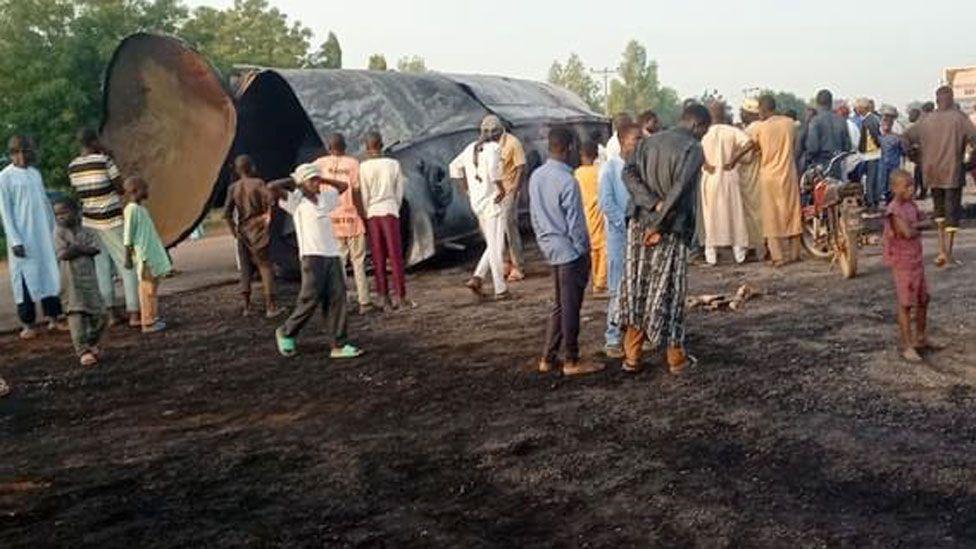In a tragic incident in northern Nigeria, at least 94 people lost their lives when a fuel tanker exploded as crowds gathered to collect leaking petrol from the overturned vehicle. The explosion occurred late on a Tuesday night in the town of Majia, located in Jigawa state. Eyewitness reports indicate that the fire consumed the tanker after police officials had cordoned off the area and warned onlookers to stay away. Despite these warnings, the overwhelming presence of onlookers led to a critical situation, culminating in the devastating inferno that resulted in numerous fatalities and injuries.
The circumstances surrounding the crash indicate that the tanker was en route from Kano to Nguru when the driver lost control, leading to the vehicle overturning. Although the driver escaped unharmed, authorities have taken him into custody for further investigation into the incident. Police spokesman Lawal Shiisu Adam highlighted the challenges faced by officers, who attempted to contain the crowd but could not prevent them from approaching the tanker amidst the chaos. The resulting explosion was catastrophic, engulfing many individuals who flocked to the scene in hopes of salvaging fuel.
Emergency services responded swiftly to the incident, with fire services and other rescue units rushing to assist those affected. However, many of the victims suffered severe burns and injuries, with 50 individuals reported to be in critical condition and transported to a hospital in the nearby town of Ringim. The scene was harrowing, as many victims were burnt beyond recognition, reflecting the intense heat generated by the blaze. In the aftermath of the explosion, efforts were made to conceal the bodies using tree branches, underscoring the tragic circumstances.
Authorities have announced plans for a mass burial of the deceased, which was set to take place later on Wednesday. The incident has reignited discussions about the safety of fuel transportation in Nigeria. Fuel tanker accidents are not uncommon in the country, often stemming from poorly maintained vehicles and insufficient infrastructure. The ongoing struggles with road safety and vehicle maintenance continue to pose daunting challenges that threaten public safety and well-being.
In a similar incident last September, 59 people perished in a fuel tanker collision with a lorry carrying passengers and cattle in Niger state, highlighting a pattern of dangerous occurrences related to fuel transport. The frequent nature of such tragedies underscores the need for systemic improvements in vehicle maintenance and road safety regulations in Nigeria, as well as greater public awareness regarding risks associated with fuel collection practices near accidents.
As this recent explosion draws attention to the urgent need for safety reforms, it serves as a somber reminder of the perils faced by communities in Nigeria. The deaths of 94 individuals in this tragic event reflect broader issues of road safety and the sociocultural dynamics that compel people to risk their lives in search of fuel. As investigations proceed and the impact of this disaster settles in, it is paramount for authorities to reevaluate safety protocols and work to prevent such heartbreaking incidents in the future.

